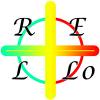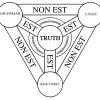Search the Community
Showing results for tags 'truth'.
-
*The following is intended as the basis for a discussion in a local philosophy group I intend to hold. Opinions and feedback much appreciated* Why Study Philosophy?There are many reasons to study philosophy, from moral, to practical, to hedonistic/Epicurean (the philosophy of pleasure associated with 3rd century B.C. garden philosopher, Epicurus), to scientific, to even religious.Once we recognize that we don't know the ultimate answers to the most ultimate questions about how we should live, and the nature of the Divine and reality in general, the remaining desire to live a morally good life, a pious life, a happy life, of even simply an honest life, seems to compel us, as the great philosopher, Socrates, (who said 'All I know is I know nothing') famously maintained, to devote ourselves to this quest. In fact, as Plato famously argued, our ordinary, pre-philosophic beliefs are similar to living in a dark cave never having once glimpsed the light; we simply grow up acquiring beliefs much like an uncleaned shelf acquires dust over the years, never inquiring into the their ultimate basis. We are like a tree already with a trunk and branches but poorly formed roots. Thus often our self-value and sense of meaning in life is very precarious, because we are literally living a lie. This is the ultimate source of much of the rage and despair we see in people today. Even if the quest for an ultimate basis of our beliefs may turn out to be partly elusive, it seems that human beings, or at least some of them, have a great longing for such a basis that compels us to make this quest for the satisfaction of our own conscience, a quest that can be enormously therapeutic and by which we can come to know what Leo Strauss called 'the true human community', which due to the inherently separate and private nature of the body, can only ever be a community of thought, of ideas, or of the mind.Science today, just like religion in the past, claims to be an authoritative source of knowledge. It claims to be unlike religion in being based on a rigorous method of experiment and observation which all but guarantees its validity. However, until we have thoroughly investigated such claims in the light of ultimate questions about what knowledge is and how it can ever be securely obtained, it cannot or should not have any binding force over us. In matter of fact, there is widespread dispute and controvery even within the scientific community itself about the reliability of much of the research published even in its most eminent journals, especially regarding the social sciences. And stories of corruption abound. Therefore, while certainly an important part of our culture that has led to many technological and material advances, it does not seem that 'Science' is a very sure foundation of knowledge. And this is even more true in the domain of values, of which science itself generally admits to being an incapable arbiter and in which the biases of Power and Custom still heavily distort things.Yet the notion that Facts and Values are totally incommunicable with/ irreducible to one another is a highly dubious, if not outright fallacious modern notion that we must be sure does not go unchallenged. in order to create or discover values that are in accord with our ultimate happiness, to realize our true will, to be effective in the world, we have to understand the nature of the machine we are dealing with as best we can. And that includes, most crucially of all, the machine that we ourselves are. One wouldn't try getting into the cockpit and flying a plane if one had never studied it, so why do we think we can operate the most complex machine in the known universe, the human brain, without similarly studying and coming to understand human nature? And the nature of society which has shaped us, and provides much of the domain for meaningful action? That is why these are questions which have long dominated philosophy as well as more recent modern day 'Science', and we shall be paying particular attention to them in our own inquiries.Thus, philosophy is not merely a moral or scientific imperative (though it certainly is that), but essential to our own happiness and sense of mental and physical well-being. It is not really some specialized 'discipline', as it is often distorted as today, (or merely a collective endeavour in the manner of 'Science'), but actually a crucial stage in all of our individual and collective development. That is also why it has often been described as 'a way of life', since the questions it raises are deep waters which one can easily devote a whole life time to trying to unravel; and thereby doing, one will undoubtedly perform a most invaluable social function, an 'archetype' (to quote C. G. Jung) of acting as a guide to truth and the best manner of life for others - for according to many, the function of a philosopher, as he who views 'the Truth' as it really is, is almost inseparable from spiritual leader or law-giver for a whole society, or even, nowadays, the whole of humankind. However, we seek to have as many 'leaders' as we can! Particularly for the young (although potentially at almost any age), it marks their coming into their own and discovering themselves anew, after a life time of socially inculcated programming, permitting a form of direct and intimate connection with the truth, with reality that can be hugely inspiring and empowering, rather than the extremely mediated manner, via institutions of power, which we are used to. This is one of the reasons why philosophy or the life of free thought is often put forward as the good or happy life, since it allows for an almost 'god-like' sense of self-sufficiency and spiritual independence on the part of its practicioners that makes them a blessing to both themselves and to those around them. That is why I do not urge people to simply become 'readers of philosophy' deferring to tradition or popular currents but active philosophers in their own right relying as much as possible on their own steam; in other words, since the nature of reality is individual, the quest for meaning itself is not an abstract, bloodless quest that others can do for you, but fundamentally the most vital and potentially life-changing question of all: 'what is MY meaning?', which though some may find challenging and can certainly be informed by the thoughts of others, (as we will do very much in this course by studying the Great Works), the beauty of it is that it is also essentially a matter of harking to responses of one's own heart, which many of us have suppressed for far too long to the detriment of our own sense of self-worth and happiness. Lastly, the love and facility for questioning and multiple perspectives and answers it opens up acts as a tremendous vaccine against censorious fanaticism, to which we as a society today are becoming increasingly once again prey, as we have so many times before. This is just one more reason why it is so crucial that all young people today be taught philosophy, which in a supposedly 'free society' represents the basis of true, (rather than merely ideologically stated), freedom and sense of mental and even physical well-being. https://madnessaformoflove.blogspot.com/2018/09/why-study-philosophy.html
- 4 replies
-
- freedom
- authenticity
-
(and 3 more)
Tagged with:
-
Please make a video on this worthless shit stain. The videos speak for themselves
- 2 replies
-
- politically
- correct
-
(and 33 more)
Tagged with:
- politically
- correct
- correctness
- political
- politics
- gate
- video game
- gamer
- gamergate
- anarcho-communist
- anarcho communist
- communist
- anarcho
- propaganda
- about
- colossus
- truth
- the
- 2
- new
- video games
- wolfenstein
- game
- signal
- games
- video
- virtue signalling
- media
- virtue
- signalling
- sjw
- social
- warriors
- justice
- warrior
-
Reason Vs. Emotion Vs. Belief Vs. Consciousness Reason, emotion, belief, and consciousness, have a fundamental place in epistemology and psychology but I have not found where they sit. I especially haven't found where they sit from first principles. My hope with this discussion is that these things can find their proper place. Emotions reflect belief and beliefs are always rational I have some ideas, each with their own arguments and evidence. From what I gather, Stefan has an implicit, specific conception of the relation between these things. The two major premises I can identify are 1) Emotions reflect belief, and 2) beliefs are always rational. Now, this second premise seems obviously false, but there is a corollary to it 3) beliefs do not necessarily reflect conscious thought. I should make it clear, by beliefs I mean what we really believe deep down and might not even be conscious of. Evidence for It's from these premises that much of the psychology in this community can be explained. We can explain the true self as rationality and the collection of beliefs. We can explain the false self as the origin of conscious thought that is not wholly informed by beliefs. We can explain free will by saying that it is a choice whether conscious thought wholly informs itself with belief. It also conforms with the evidence. It explains self-defence mechanisms where a person consciously thinks something but believes something else. It explains how personalities as a collective can be fragmented throughout history from all the evils that take place. It gives foundation to how a child protects themselves with false thoughts. It explains how psychotherapy works, by uncovering beliefs using critical thinking and self-reflection. It explains procrastination, as procrastination just reflects the belief of resentment. It would suggest we should follow our emotions as long as we identify them properly. Evidence against The issue is, there is a lot of evidence against these things. Are emotional leftist protesters simply misunderstanding their emotions? Are they masking a true self with a false self? Do people fall for propaganda because of the false self, or maybe we aren't actually innately rational? Another problem is, it seems incredibly redundant to have a true self making calculations, and then a false self making entirely different calculations about the same thing. Cognitive therapies suggest something is wrong with cognition itself. For example, schema therapy suggests that we have core beliefs that are often themselves unconscious and formed in childhood that are irrational and make us feel some ways or generate negative thoughts. It would be strange to have an extra layer to this by saying that those irrational core 'beliefs' are preceded by true beliefs. It is very hard for me to believe that emotions reflect belief and beliefs are always rational. But it also explains so much and makes life a lot easier. Argument for from first principles Extraordinary claims require extraordinary evidence. Rather than doing some kind of trial-and-error, making observations, etc, an argument from first principles would take away a lot of doubt about the psychology taught in this community. I would think that arguing for these psycho-epistemological concepts from first principles would be the most important thing, as the psycho-epistemology kind of defines what this whole community is about. I tried to find these first principles, and I found these quotes from Ayn Rand. "There can be no causeless love or any sort of causeless emotion. An emotion is a response to a fact of reality, an estimate dictated by your standards." (Ayn Rand, For the New Intellectual, p. 147) All knowledge is derived from reality, so emotions follow cognition. Perhaps we could further say from this that emotions reflect cognition. And, perhaps we can assume cognition and reason that goes with it have sovereignty. Indeed, doesn't seem logical that a rational faculty would allow something like 2+2=5. It is more likely that anyone who thinks such a thing is not using their rational faculty. It would also seem strange that the rational faculty would switch off, rather than keep working at the background. In fact, I think that our very feeling of having a self and having free will sort of rest upon the idea that we have some kind of sovereignty, and that we know what is best for ourselves, and we trust our faculties to give us the most accurate information possible. Perhaps this should be self-evident. Perhaps this is self-evident to any peacefully parented individual. Argument against from first principles Ayn Rand would disagree with our second premise; that beliefs are always rational. "Your subconscious is like a computer—more complex a computer than men can build—and its main function is the integration of your ideas. Who programs it? Your conscious mind. If you default, if you don’t reach any firm convictions, your subconscious is programmed by chance—and you deliver yourself into the power of ideas you do not know you have accepted. But one way or the other, your computer gives you print-outs, daily and hourly, in the form of emotions—which are lightning-like estimates of the things around you, calculated according to your values." (Ayn Rand, Philosophy: Who Needs It?, p. 5) also, "An emotion as such tells you nothing about reality, beyond the fact that something makes you feel something. Without a ruthlessly honest commitment to introspection—to the conceptual identification of your inner states—you will not discover what you feel, what arouses the feeling, and whether your feeling is an appropriate response to the facts of reality, or a mistaken response, or a vicious illusion produced by years of self-deception . . . . In the field of introspection, the two guiding questions are: “What do I feel?” and “Why do I feel it?” (Ayn Rand, Philosophy: Who Needs It?, p. 17) Rand is seeming to suggest emotions can reflect irrational thoughts. It seems beliefs held in the subconscious can be 'programmed by chance'. She says that using the rational faculty is not automatic but voluntary. So it has sovereignty, but it is up to a person to use it. Her view does make a lot of sense. Our working memory is incredibly limited, so thinking rationally would be incredibly limited. Perhaps there is no 'true self' beyond our ability to reason consciously. If Rand is right, I believe it challenges the psychology of this community. Rather than listening to a true self, and to emotions and their origins, her views would suggest we should rather use reason alone to find what is the right thing to do and to create habits out of it. Perhaps one problem with her view is that there is no ought from an is. It makes a lot of sense to me that only emotions can tell us something as trivial as what flavour of ice cream to have and something as serious as whether I should really marry some person. Maybe the truth is somewhere in between. Maybe the subconscious can be 'programmed by chance', but maybe it a somewhat active system which holds our true beliefs, while our conscious thoughts themselves can differ. What do people think? Can these premises be proven from first principles? Maybe you think the premises I outlined are inaccurate? How do you think is the best way to approach and deal with emotions and choices? Have any podcasts/books to share about this stuff?
-
In FDR3077 Stefan makes the claim: If there were cases of actual wrong doing by the police where the police are exonerated for killing someone due to racism, then these cases would be front and center rather than the false stories that they are choosing to report on instead. Would they? I believe I have heard Stefan make this claim in other places as well. Stefan is now speculating as to the motives of the media for reporting falsehoods. Since we are speculating about motives, I have an alternative theory: Suppose the motive of these false reports were divide and conquer. Would it make sense to report obviously true stories of police racism? If you report the true story, then everyone rational is going to agree that racism is a problem and there will be unity. However, if you trump up a false story, the rational people are going to oppose such a story and be lumped in with racists. So, reporting a true story about racism is uniting. We can see this with the civil rights movement starting in the 1950’s. Television showed what racism really looks like and rather than dividing, it united whites with blacks because they were both abhorred by what was actually going on. Now, suppose instead of showing blacks sprayed with firehoses for protesting or being arrested for trying to eat at a restaurant, the media showed false examples of racism and then tried to hold them up as true examples of racism while intentionally ignoring or even burying the true examples? Would that divide or unite people? My point here is that maybe rational people are being manipulated more than we think. Maybe there really are plenty of true examples of police racism but they are not being reported because the media has a divide and conquer agenda and reporting true examples of police racism would unite people rather than divide them. Any thoughts?
-
Hello fellow classical liberals, I recently wrote a piece exploring the ultimate truth and the meaning of life, with a focus on science, religion, and language. If you are interested in these topics please visit www.glenwillson.com Thank you!
- 5 replies
-
- new atheism
- science
-
(and 5 more)
Tagged with:
-
I have been convinced for quite some time that I want to help the fight for Truth and Western Civilization. I already donate monthly and work on self knowledge for several hours a week. I have already been having conversations with everyone around me even including strangers. (I work temporarily overnights as cashier currently far far below my potential but talk to everyone I can and manage to get some Socratic dialogue and good plugs in for yourself, JB Peterson, No Agenda show and others) When the "what do I do" show came out I was excited because I have been racking my brain for months trying to figure out specifically what I can bring to the table. However, I believe I am already covering these bases. Is it possible I am overlooking something? After the charity baseball Shooting I am motivated to act ASAP, And Listening to your latest call in show with the Swedish nihilist prompted this question: How do I find my niche and figure out what I can bring to the table? I'm not sure of anything to say that isn't already being said. I know that I have a lot of untapped potential but I have no idea where to focus it. Edit: I want to focus my efforts on saving the future, I just don't know how to figure out what's needed of me. Stefan and others are doing a great job covering important issues and I don't know what else I could add that wouldn't just be extra noise
- 12 replies
-
If you value god more than you value logic, reason and evidence, then a constructive conversation about truth is impossible.
-
Are there many FDR listeners here in Auckland? I have moved to the city recently. It would be great to meet some like minds in this city.
-
I am asking this because recently i had an apphipheny (spelling?) about my anger and reason why i have been so struggling with motivation, is because as kid and always i did good rational things for other sake. IN THE PAST, (especially childhood and teens): Why be good? Because others. Why be good? Rules. Why be rational? Because unhappiness otherwise and because its hurts OTHERS. So i find myself in almost ego-death'esque situation with my own beliefs about myself. Why should i do or be anything or anyone? Why simply not lie, be crazy, insane, and contradictionary? WHY does it really matter what i want? What’s the difference between my preferences and anyone else? Why shouldn’t i just take other peoples desire as my own? Yes, this is also about setting or not setting Rules for yourself. And also about the value of myself value if any of my preferences? Why should i prefer anything at all? And is this question itself contradiction on some level? Do i "prefer" truth over falsehood? I do or maybe i say i don’t. Maybe i say gibberish. Then what? Does it all come down to preference? And if so... why do i feel like that’s an arbitrary/subjective standard and thus meaningless or exactly the same as anyone else’s opinion or preference? I feel like my preferences do not have any value objectively. I prefer health? I prefer truth? I prefer to be moral and kind and good? Who cares about that? PS. Yeah... one could say that i sound and come off as bit of nihilistic... but that’s empty one feels when finally your shrugs off your FALSE reason to be X Y or Z. When false-self goes, when "respect" for parents complete evaporates. When values placed and forced in me by abusers vanish.
-
Does Stef see these messages? I am noticing that Malcolm X is starting to come up a lot in discussions surrounding race relations in the USA as of late, and I thing a Truth About Malcolm X would be a great video to see. Methinks the celebration of this figure is far more misplaced than the celebration of MLK, and we can see how flawed MLK is.
- 3 replies
-
- Malcolm X
- Truth about
-
(and 3 more)
Tagged with:
-
Hi guys, A question that has been bothering me lately is: why do we sometimes use objective truth (science, logic) to acquire knowledge but yet sometimes we are comfortable using the Aristotelian mean as a way to answer a question? Why is virtue treated separately from, let's say, ethics (objectivity) or aesthetics (subjectivity)?
-
Part three in my three-part article series on the voice of reason. "We’ve already established why and how disconnected people react when in confrontation with reality, and that in order to remain in denial and disconnection one has to ignore trauma and silence reason—that of other people and in themselves. Here, I will talk about the personal and social effects of being a voice of reason." Read more here: http://blog.selfarcheology.com/2016/02/silencing-voice-of-reason-part-3-pros.html
-
Part two in my three-part article series on silencing the voice of reason. "Having principles carries a lot of weight. Your thoughts and emotions dictate your behavior. So if you have a certain mindset, you will act in a certain way. When you live in a highly delusional and unprincipled society as ours, having principles and applying them consistently requires enormous inner strength and courage. Your life is different than that of most people; your priorities are different than most people’s; your relationships are different; you see things that other people don’t see. And when you describe those things, people who are highly invested in staying unprincipled and irrational—that is the majority of our population—get upset and unruly." Read more here: http://blog.selfarcheology.com/2016/02/silencing-voice-of-reason-part-2-values.html
- 3 replies
-
- 1
-

-
- virtue
- principles
- (and 8 more)
-
I am taking a class in my 3rd year of university called research methodology. the first lecture discussed nursing research, the role it has within the profession and in healthcare. A large part of the research was about types of research and the main paradigms that researchers subscribe to. There is the positivist paradigm and the naturalist paradigm. Each camp has its own views about reality. Positivists are empirical and objective, believing " . . . that there is reality out there that can be studied and known . . . objective reality exists independent of human observation." (Loiselle & Profetto-McGrath, 2011). They are called determinists as they believe that phenomena not random but have antecedent causes and they use an approach that involves realiance on orderly, rigorous procedures with tight control over situations to test predictions about the nature of phenomena and they relationships among them. (Loiselle & Profetto-McGrath, 2011). Positivisists use quantitative research methods, meaning they find ways to measure phenomena so that they can use statistics to analyze data. Naturalists are presented as a countermovement to positivism. The naturalistic researchers, reality is not a "fixed entity" but rather a construction of the individuals participating in the research ( (Loiselle & Profetto-McGrath, 2011). They are relativist thinkers who posit "if there are always multiple interpretations of the reality that exists in people's minds, then there is no process by which the ultimate truth or falsity of the contractions can be determined." They believe that knowledge is maximized when the researchers and the participants are close to one another. They listen to voices and interpretations of those under study because they think that subjective interactions are key to understanding phenomena (Loiselle & Profetto-McGrath, 2011). These researchers use QUALITATIVE methods. My professor revealed her bias toward Qualitative research methods throughout the lecture. Her tone and word choice are what lead me to believe she had a bias. When speaking about QUALitative research methods she words like: we, us, our patients. When she spoke about QUANTitative research she used words like they and them. She said something like, "they think all people are the same, they treat people like numbers and not unique individuals". Two other professors, with whom I have discussed the possibility of performing and publishing research as an undergraduate, have leaned heavily toward the naturalist worldview. They seem to discourage quantitative methods. My analysis of the situation: Qualitative research has a place in any social research area. It is often used to simply explore groups and populations of people gain insight as to what phenomena may exist. Which sets the stage for people who do actual science to produce credible information about our world. For some reason qualitative research is presented as an equal methodology. If we are seek to be intellectually honest we should simply describe it as what it is. A method in which a researcher gathers subjective information from a very small group people or even a single person, then presents a subjective interpretation of that information. I think the undue respect given to qualitative research is largely the fact that it is an easy way for a Professor to appear productive. Math takes to much effort. Why would a person (a person as Hobbes sees people) put in the effort and time to publish quantitative research when they can produce qualitative papers 4 times as fast? Publishing Quantitative research requires the use of math/statistics while qualitative research can be as easy as writing a glorified blog post. The pay is the same for either way. Nursing is also dominated by women who constantly seek to validate their profession. They want to be seen as professionally equal to physicians and even express feelings of moral superiority claiming they love and truly care for their patients. Yes, it is important that patients feel like their healthcare providers actually care about them because it fosters a belief in ones ability to overcome disease. It is also simply nice for patients to be around kind people, but flattery, warm feelings, and bad acting don't cut the cancer from their bellies or prevent micro-organisms from overwhelming their systems. To do that you need to draw from 100's of years of truth (that which is rational consistent and empirically verifiable). So now that I have had my rant. Do you think the naturalist paradigm (qualitative research) should be considered truth?
-
So today while studying psychology I met this girl who said that she doesn't believe that we have free will. She said that we are like animals, only a bit more complicated. She also said that we can't really effect on what happens to us in the future, because everything we do is just a chain of complicated decisions made by our brains for us in search for happiness. This made me very sad and I can't get it out of my head... What if I really am just a brain and couple of other organs in my body. Perhaps I don't really think about things the way I believe, but am just being l controlled by a bunch of mindless instincts. It's really making me a bit nervous... Has anyone ever thought about this, or could share his opinions? I would like that a lot. Markus FIN
-
I'd like to start a new topic even though I found one with the wrong order of the three words that I think matters because of the meaning of the equal sign here. http://board.freedomainradio.com/topic/33098-reason-happiness-virtue/?hl=%2Breason+%2Bvirtue+%2Bhappiness I think I heard in one podcast Stef saying a different version "Reason + Virtue = Happiness", but I can't find it. How do you understand this? Reason leads to virtue which leads to happiness. Is this a more accurate version? Is it possible to use reason for vice? What are the definitions of reason, virtue or happiness? Is it possible to prove any part of this statement? Here are my thoughts on why reason (or truth) is at least necessary (may be not sufficient) for happiness. A person who has a valid theory describing the surrounding physical reality is happier than the person who doesn't have such theory or has an invalid theory. The reason for this is that if your theory is invalid (or you don't have one) then your expectations on how the reality behaves are inaccurate. You don't know what to expect or the reality regularly produces not what you expect. Uncertainty could be dangerous and also leads to frustration making you less happy. For example, people not knowing the theory of weather may pray and offer sacrifices and still have gods sending them bad weather. People having an invalid theory of government may often get upset about the political process and poor economic outcomes.
-
I was researching The Laws of Logic and came across this... Found it slightly humorous, but mostly frightening. In some places I think he is using Aristotelian logic to disprove logic. And in another place he uses the fact that more than one system of logic exists as proof that all logic is relative. Let me know if I am correct in thinking that this guy is a well trained sophist. It's a a bit much for one person to try and digest. Below is the first little bit of a long article, here is the link to the actual article: http://fatfist.hubpages.com/hub/There-are-NO-Absolutes-There-is-NO-Absolute-Truth INTRODUCTION Some people may be surprised to discover tons of self-professed Messiahs of Philosophy on the Internet, especially on YouTube. What is not surprising is that almost none of them have bothered to educate themselves on the 2500-year-old Philosophical concept called the “absolute”. These Priests of Philosophy have no qualms about claiming that there are “absolutes” or “absolute truth”. What kills their claims is that they cannot define the key words that make or break their argument: ‘absolute’ and ‘truth’. They are merely parroting what they heard from the grapevine: “ummm, duh,....are you absolutely sure there are no absolutes? See, gotcha....there are absolutes. Also, that there are no absolutes, is an absolute statement. Ha ha, gotcha again, I win!” These Priests of Philosophy are quick to break out the bottle of champagne in celebration of the argument which they won in their own mind. But, they are quite embarrassed when a member of the audience stands up and asks them to define “absolute” and “truth”. What is funnier is that they cannot even give a single example of a statement which resolves to absolute truth. And more embarrassing for them is that their silly childish questions are not even arguments....THEY ARE TRICKS! These trick questions have a very simple ANTIDOTE. Click on this link to see their tricks exposed: http://fatfist.hubpages.com/hub/ABSOLUTE-TRUTH-Is-it-Absolute-True-there-are-NO-Absolute-Truths This article exposes the Religion of The Absolute. You will understand why the "absolute" is the Hallmark of Religion and the Opium of Fanatics. We will explain why the word “absolute” ultimately resolves as a synonym of the word RELATIVE. Furthermore, you will understand why these Priests of Philosophy don’t want you to read this article and understand the critical analytical issues behind the words “absolute” and “truth”. Your ignorance is their blessing. After all, they have surreptitiously fooled you into having FAITH in absolutes; so they do deserve some credit. WHAT IS TRUTH? The word “truth” is a concept which has been conceived by humans for use as a conceptual label of validation on statement types known as propositions. Propositions are statements which propose an alleged case or scenario. This anthropocentric concept of truth is unwittingly used by many people to intentionally decree a label of “validated acceptance” (i.e. true) or of “validated rejection” (i.e. false) to propositional statements. But since truth ultimately stems from the validation of propositions, it necessitates an observer who must VALIDATE the proposition before they can label it as ‘true’ or ‘false’. It is obvious that the word “truth” is ultimately dependent on a dynamic process that an observer must perform before labeling a proposition as true/false. This process of validation is called PROOF. A proposition labelled as true/false is always dependent on a human observer’s ability to use their magical powers to validate it as such. Q: So how do humans validate or prove a statement as truth? What magical powers do they use? A: Their subjective and limited sensory system! Since the concept of truth is ultimately dependent on a human’s subjective use of their limited sensory system, it is easy to understand why all truths are subjective; i.e. opinions. Truth is an observer-dependent human-related concept that is inherently subjective. As such, it necessarily resolves to none other than opinion! This limited anthropocentric concept cannot possibly be objective. What is TRUE to you, is a LIE to your neighbor! Your Priest may have convinced YOU of the truth for God, dark matter, black holes, warped space and energy, but he hasn’t convinced your neighbor. Truths are inherently biased. Truth is what is dear to YOUR heart & soul, only. Truth means that the Priest had his way with you while you were in the confession box. For all intents and purposes, you can use the word “truth” as a synonym to the word “opinion” in every scenario, and you will not change the context or meaning of your dissertation. Just try it and see for yourself. Remember: TRUTH = OPINION. Those who disagree, all they need to do is answer the following questions for the audience: 1) What magical means do they use to resolve their statement as being TRUE? Do they use their sensory system? Do they vote on the issue? Do they ask their Priest, God or a higher authority to decide? 2) Is it TRUE that TRUTH is correct? What standard does one use as a benchmark for testing and evaluating TRUTH to be correct? They obviously cannot use truth!!! Anybody wanna step in the lion’s den and answer these questions for the audience? Are you scared to answer because you will expose your Religion of Truth, or because you don’t know? Be honest with yourself.
-
I propose a new game. Post premises followed by a logical conclusion based on those premises. Example: 1. All mammals are animals 2. Humans are mammals Therefore all humans are animals or a logical conclusion that is faulty and fun. Example: 1. Life is valued by people 2. To live calories are one thing people need 3. Candy is dense with calories Therefore people that wish to live should eat a lot of candy.
-
Hey ya'll. Below is a whole lot of research condensed into twenty minutes with reasons why milk is detrimental to health and is cruel. Highly recommend it. Below is an even further condensed edit by myself.
-
Hello! So, I recently bought a book on anarcho-capitalism, called The New Libertarianism: ANARCHO-CAPTALISM by J. Michael Oliver. It's an attempt to reconcile objectivism with anarcho-capitalism, and as such it explains the basics of objectivist metaphysics. I'm at the very beginning of the book, where he talks about the existence axiom, but the problem is that I don't get it. The basic argument is that we are conscious, and if we're conscious there has to be something objective (outside of our minds) that we're conscious of, but is that really true? Can't I be conscious of my own fantasies? Thank you! /Sebastian
- 3 replies
-
- metaphysics
- axiom of existence
- (and 6 more)
-
I can read the the Bible now. Has anyone gone or is going through this? I understand now why I have clung to that kind of faith. My traditional catholic upbringing makes sense now that I am Atheist. In the name of the Father = Truth. The son = Empathy. And the Holy Ghost = self knowledge. Amen=sealing the truth empathy and knowledge together.One God three divine persons. This is why the Bible is the most popular book in existence. This is what Jesus discovered and tried so hard to show the world. The world rejected him and killed him for it. This is why we feel empathy for Jesus. Everyone who clings to faith is guilty about rejecting the reality of truth. This is why I have cried and sobbed while praying to Jesus. I've broken down to him in that state but know now I was trying so hard to break myself down to understand what he went through. This is why I have always loved my religion yet have always felt hypocritical my entire life pursing the truth in the manner from with which it was presented to me. Have you all felt this? Do you feel the same? This is incredible. I don't hate my faith anymore. The two parts of me I thought have separated have not. I've always been whole. The abuse I've suffered is what caused me to split in two. This is the true reason why the world is the way it is. Wow. I've always said to myself about Jesus after I had heard it somewhere. "Whatever you want to believe about God know this: One mans death changed the world forever." Wow. I understand Everything makes sense! How this is possible! Wow. I need to start my deep breathing and focusing on things here and now. Golllleyyyyyyyy! Also sidenote: Now I am not moving at warp speed. lol. I have been doing this "stuff" my entire life and had no idea. I've slowed down and changed some things around that I was doing. I think because I've come to this reasoning this whole experience just got so much easier. I understand now. I am so happy I found freedomainradio. I appreciate your time reading this. Wow. Fourth time editing I have to say one thing very clear. I AM NOT TRYING TO GIVE ADVICE AT ALL! I feel as if I did not say that clearly enough. I'm trying to feel empathy and am using this board to help me. Expressing this emotion I've felt this morning has been another huge step in the right direction. I am getting help for this just so everybody knows. 7th or 8th time editing this. I was putting Jesus above other men because of the abuse I have suffered. This is why this has caused me such relief. Because that turmoil surfaced. If you can see the fact that I empathize with jesus now has scared me. This caused a reaction. That reaction caused me to recognize my issues with my sexuality. This is not advice these are my thoughts.
- 22 replies
-
Hello all-- I hope this message finds you all well. This is my first serious post on this forum, the topic is an effort to externalize events that have been very close to my heart, as well as my lifelong effort in search for truth in spite of the plethora of "blinders" that have been installed on the chariot of my mind for the sake of my father's emotional comfort. To start my name is Matthew, aged 22, African American. I have lived in Columbus Ohio all of my life, and currently a struggling (REALLY struggling) musician. I play the violin, forte in avant-garde music and deconstruction. I mention this because it's indicative of how my mind works: to harness logic to render a given subject down to it's purest expression, or to unveil its objective Truth. I believe that it is this drive that led me into the many religious traditions I've learned about and practiced, as well as my final leaving of the concept of creator all together. Like most, I was raised in a Christian household. If my father was not reprimanding me as a small child, he spoke of his religious philosophy ad nauseum. I naturally was extremely inquisitive, and the first occupation I wanted to be was a scientist-- I really LOVE to learn. I learned very early not to question the words of my father, not for any threat of violence ( though that did occur) but because I really seemed to cause harm to him personally when I ever questioned him, and he would disassociate himself from me for some time. I would rather a beating than to be alone. I remember one time I asked him if I could have a dog (I was around 3), and he said "maybe". I was ELATED, he didn't say yes, but he didn't say no either, so "maybe" in my head was obviously more positive than "no", so if I was a good boy, "maybe" I could sway the verdict to "yes!" someday. Time passed, and he said nothing of it-- maybe he forgot? I reminded him, asking again. "Maybe" in his light tone again, but I was a bit more skeptical this time. I kept asking, and got the same answer; now "maybe" was getting pretty annoying, and I started to just want a straight answer. One day I asked him again, and he said "maybe" where I quickly responded "so maybe means no right? Every time you say maybe I don't get anything." I'll never forget the look on his face, he was genuinely shocked speechless, probably because I didn't talk very much at time and the information I had gathered from my observations were pretty concise for a 3 year old. My mom was present at the time and instantly started cracking up, bellowing "He really gotcha there Mark, whatcha gonna say to that?". I saw him lower his head and narrow his eyes(tense) with unmistakable disdain, avoiding eye contact with me. I made the silent choice then to never do that again, I never wanted to hurt my Dad. Needless to say, he stopped talking to me for some time which was really painful to me, especially since I was alone for most of the day anyway. Later on, Dad would speak to me about religion A LOT. Not only did he believe in his doctrine, but believed he had performed many miracles himself! As a kid this captured my imagination, and really inspired me to study religion with all I had --"Maybe" then I could control my universe as well? He spoke on glossolalia (tongues), prophecy, hinted on Revelations, and the spiritual sight (the seeing of demons and angels) along with all the usual indoctrination. This particular instance of which I am about describe I'm sure has sealed my fate, and realization of my own "atheism" (for lack of better words). Around the age of 9 or 10, My Father would randomly take me to the side to solidify my "belief". Shortly after this series of lectures I under immense emotional strain and fear of damnation decided to be baptized. Back then he was still much taller than me, and I remember him casting a shadow over my face as he laid out his huge, bulky fists in front of me. "Choose" he would say in a deep voice "Choose, your fate, choose your master, life or death, good or bad, God... or Satan." The air was tense, I felt the fate of being held in the balance. My father's eyes were indifferent, though I knew what choice he'd rather me take. Naturally I chose "God", and he'd smile and walk away-- phew! This happened a few more times (didn't I just save my soul yesterday?), until he took me aside to the living room to introduce me to the point of SUBMISSION. The television was off, the lights dimmed (or they seemed to be). That familiar sense of tension was in the air, Father paced back and forth in front the broken fireplace. He spoke in a low, grave tone and started to elucidate the virtue of unconditional surrender, it's eternal imperative of a "true" christian for a couple hours. As usual, I simply did not possess the attention span to follow everything he said, and I started to feel quite frustrated and scared-- was I missing something? This is cosmic knowledge here and my flesh is simply too weak to withstand the divine logos! He asked me finally, "Imagine you are before the Lord, Christ at his right hand-- how would you greet him?" I smiled and bent my knees-- "NO. You need to be on your face." or something to that effect. It took awhile, but I finally got groveling down. Father smiled and left, leaving me completely overwhelmed, but relieved. I want to express my journey to atheism because I have an annoying need to share my true thoughts, but the journey is simply too long to put in a single post. I would love to see what you guys on here think about this so far, if there are any thoughts you would like to add. Thank you
-
- Christianity
- Hinduism
- (and 8 more)
-
I just met an awesome dude. It turns out that he recently completed a book/audio package called "Bedtime Adventures for the Authentic Self" so I bought a package. Yay! I figure it wouldn't be a bad idea to share his website here... http://authenticselfkids.com/ “Imagine…Not just one, not just a few but a whole generation of children fortified with a foundation of practical truths and applicable techniques to access their own inner sanctuary and ultimate potential. A generation grounded in principles which allow them to find a way to be in harmony with nature, themselves and others. A generation of enlightened ones otherwise known as “Generation Authentic”. — Bedtime Adventures for the Authentic Self
-
Hello everyone. I analyzed the song "Counting Stars" by OneRepublic, you can read it at my blog here http://bit.ly/1eEqiBs. Enjoy and I hope you will let me know what you think!
-
I believe I have experienced this. I would like to know first the opinion of everybody and anybody out there. What do you all think of this? I only ask this to you all because now I see the truth everywhere. My life will never be what it was before today. In seven days I have overcome addiction, god, my family. I have gained love and empathy for myself and others. Has anyone had this happen?












